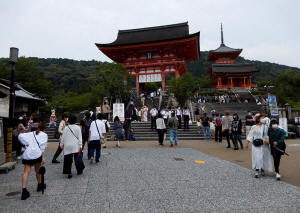|
The
number of foreign visitors for business and leisure was 3.04
million last month, steady from the level in April, and down
slightly from the all-time monthly record in March, data from
the Japan National Tourism Organization (JNTO) showed.
Arrivals last month were up 60% from the same period last year
and 9.6% higher than in May 2019. Japan had a record 31.9
million visitors in 2019 before the COVID-19 pandemic shut
global borders.
The weak yen, languishing at a 34-year low against the dollar,
is helping fuel a tourism boom in Japan. That's good news for
the economy, with travellers spending a record 1.75 trillion yen
($11.1 billion) in the first quarter of 2024, according to the
JNTO.
But the influx has raised concerns of "overtourism" at visitor
hot spots. On Monday, the mayor of Himeji in western Japan
floated the idea of charging foreigners three times the standard
1,000 yen fee to enter the city's famous samurai-era castle, the
Asahi newspaper reported.
In explaining new trail fees to curb overcrowding on Japan's
sacred Mt. Fuji, Yamanashi prefecture governor Kotaro Nagasaki
told reporters this week the country should focus on attracting
"higher spending visitors" over sheer masses of people.
Chinese travellers, previously the biggest contingent of
Japanese tourists, are still about 30% lower than pre-pandemic
levels. But travellers from other markets are picking up the
slack, such as Indian visitors who reached a monthly record in
May, JNTO data showed.
Dalia Feldman, marketing director for Tourist Japan, said her
firm has seen an 11-fold increase in inquiries from India in the
past year, while those from the United Arab Emirates are up
almost eight fold.
"It appears it is the Japanese cuisine and natural sights that
attract them the most," Feldman said. "Most of our Indian and
UAE customers will ask to include some more food tours in their
itinerary as well as external trips to remote and scenic areas."
($1 = 157.8200 yen)
(Reporting by Rocky Swift; Editing by Eileen Soreng and
Jacqueline Wong)
[© 2024 Thomson Reuters. All rights
reserved.]
This material may not be published,
broadcast, rewritten or redistributed.
Thompson Reuters is solely responsible for this content.

|
|




